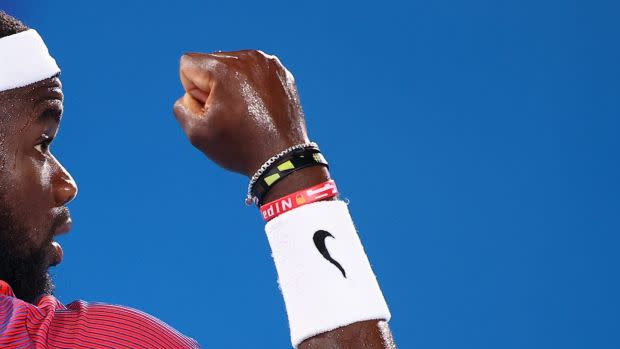Olympians are influencers now too
- Oops!Something went wrong.Please try again later.
- Oops!Something went wrong.Please try again later.

For the first century of the modern Olympic Games, professionals were barred from competition. The Games were a place the world saw largely unknown and unpaid athletes compete on the international stage.
In sports with major pro leagues, that meant the Olympic heroes were largely college-aged athletes. Before Michael Jordan returned for the 1992 Dream Team, he led the 1984 US men’s basketball team to Olympic gold as a 21-year-old star at the University of North Carolina. Boston University’s Mike Eruzione became a household name after captaining the US men’s hockey team in the so-called Miracle on Ice in the 1980 games when a team of amateur hockey players defeated the Soviet Union, a David and Goliath moment in sports history.
In sports outside of the Big Four professional American sports — baseball, basketball, football, and hockey — every four years brings a new squad or star to root for. In women’s gymnastics, it was the Magnificent Seven, the Fierce Five, the Final Five. Track and field athletes, swimmers, and divers, mostly unknown except to the sports’ most devoted fans, became household names whose likeness appears on the side of Wheaties cereal boxes.
A new normal
By the 1992 Olympic Games, the dam started to burst. More professionals were allowed to compete, paving the way for the Dream Team: basketball stars like Jordan, Charles Barkley, Larry Bird, and Karl Malone all took the court in Barcelona for a historic gold medal performance. Today, every Olympic sport allows professionals.
Though, the Olympics is now the realm of professionals, the Olympics is still about discovering new stars. Only this time, many are getting paid through endorsements and social media.
At the Olympics, contemporary fans root not only for their country’s athletes, but for their favorite influencers and social media stars. American Paralympic track star Hunter Woodhall has 2.6 million TikTok followers, American beach volleyball player April Ross is on celebrity shout-out platform Cameo, and British diver Tom Daley has documented his journey to Tokyo where he just earned a gold medal — for his 900,000 YouTube subscribers.
One of the last vestiges of amateur sports in the US was dismantled earlier this month when the National Collegiate Athletic Association (NCAA), under pressure from state governments and the US Supreme Court, changed its rules to allow college athletes to profit off their names, images, and likenesses (NIL). For any NCAA athletes participating in the Tokyo Games, that means they can cash in on any endorsement deals, monetize their social media accounts, or sell their own merch.
The Olympics itself changed an important rule last year too. Previously, athletes could not profit off their NIL for a period before, during, and after the games. That meant only the Olympics’ biggest sponsors would benefit from endorsements and advertisements around the games. But that’s gone too—so enter the brands! Superstar US swimmer Katie Ledecky alone has endorsement deals with Adidas, Panasonic, Visa, and sportswear company TYR.
Celebrity beyond sports
The Olympics may no longer celebrate amateurism, but what is really an amateur endeavor in sports anymore? Social media users are now “creators.” Hobbyists are part of the “passion economy.” Olympians can monetize their fame on Cameo, TikTok, Instagram, and more with brand deals, custom apparel, and sponsored posts online.
Olympic athletes can now make a real living off their fame at the moment their hard work finally pays off. For many athletes, the Games are often a fleeting burst of fame after spending most of their adult lives training for the opportunity to compete on the world’s greatest stage. This new normal means they can take full advantage of the moment before the Games, during it, and afterward.
The romance of amateurism may be gone, but in its place is something far more rewarding for a competition that does not pay its participants. Amateurism may be dead and that’s okay. Athletes are influencers now.
Sign up for the Quartz Daily Brief, our free daily newsletter with the world’s most important and interesting news.
More stories from Quartz:
This CDC map shows where in the US people should wear masks again
The two biggest names at the Tokyo Olympics stumbled on the same day
